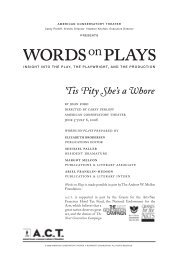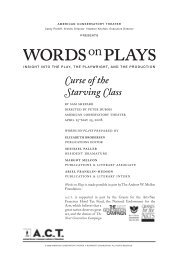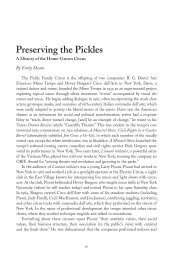SEP/OCT 2013 - American Conservatory Theater
SEP/OCT 2013 - American Conservatory Theater
SEP/OCT 2013 - American Conservatory Theater
You also want an ePaper? Increase the reach of your titles
YUMPU automatically turns print PDFs into web optimized ePapers that Google loves.
ColonialAmerica<br />
and the<br />
WORLD OF 1776<br />
ABOUT THE PLAY<br />
By Dan Rubin<br />
It is the summer of 1776. Nearly 300 years have passed since<br />
Columbus sailed the ocean blue; since John Cabot became the<br />
first Englishman to arrive in the New World; since Amerigo<br />
Vespucci gave his name to two continents. It has been nearly<br />
200 hundred years since Roanoke, the first English colony in<br />
the New World, was settled and lost. The <strong>American</strong> institution<br />
of African slavery, started by the Dutch and continued by<br />
the English, is 157 years old—and fully intertwined with the<br />
plantation economy.<br />
It has been almost a century since England started imposing<br />
its rule on the unruly colonies, populated by men and women<br />
who left England and Europe to escape such meddling, to<br />
be freer than they were back home. In 1686, the colonial<br />
governments were dissolved and replaced; the Crown’s<br />
representatives assumed all judicial and legislative power.<br />
In the 90 years since, the British crown has passed from<br />
James II to William III and Mary II; when William III died,<br />
Queen Anne ascended, followed by her second cousin King<br />
George I, then his son, George II, then his son, George III.<br />
Wars between England and France and England and Spain<br />
crossed the Atlantic and played themselves out in the colonies;<br />
sometimes they even started in the colonies, as when a young<br />
Virginian major named George Washington attacked a French<br />
outpost in the Ohio River Valley in 1754, igniting the costly<br />
French and Indian War.<br />
The <strong>American</strong> colonies have been expensive for England to<br />
maintain. There were 1,500,000 colonists by 1760, and many<br />
on the frontiers wanted to keep pushing farther and farther<br />
west into Indian territory. So George III halted expansion past<br />
the Appalachian Mountains, and in 1764 Parliament passed<br />
the Sugar Act, a duty on numerous imports (sugar, textiles,<br />
coffee, wine, and indigo, to name a few) to offset the debts of<br />
the French and Indian War and finance the governance and<br />
protection of the colonies. The following year, Parliament<br />
passed the Stamp Act, a duty on all printed goods, and the<br />
Quartering Act, requiring colonists to house and feed British<br />
troops stationed in America.<br />
The colonial backlash was swift. British duty-collectors were<br />
harassed. Nonimportation protests crippled the harbors. New<br />
York City hosted the Stamp Act Congress and nine colonies<br />
sent representatives to compose a resolution decrying taxation<br />
without representation. And it worked: George III repealed the<br />
Stamp Act and the boycott on English goods ended.<br />
Then in 1767 Parliament passed yet another series of new<br />
taxes, the Townshend Acts. Protests again followed, culminating<br />
in 1770 with the deadly Boston Massacre, during which five<br />
colonial agitators were shot down. The bill was repealed.<br />
Then in 1773, Parliament passed the Tea Act, and Boston<br />
rebels responded by dumping 342 chests of tea into the harbor.<br />
A series of retaliatory Coercive Acts (dubbed Intolerable Acts<br />
by <strong>American</strong>s) followed in 1774, and during the ensuing<br />
protests, Massachusetts was placed under military law.<br />
Still, Massachusetts was just one of thirteen colonies.<br />
When the First Continental Congress convened in 1774 in<br />
Philadelphia, very few people were thinking of separation.<br />
Most delegates (and the constituents they represented) still<br />
believed in reconciliation with the motherland—once the<br />
mistreatment they suffered was addressed.<br />
But in early 1775, Parliament declared Massachusetts in<br />
rebellion, and in April British soldiers marched from Boston<br />
to Lexington and Concord to capture Sam Adams and John<br />
Hancock and destroy the colonists’ arsenal. The troops were<br />
rebuffed by 70 minutemen and chased back to Boston. It was<br />
a turning point. Later that month, the Second Continental<br />
Congress created the Continental Army and commissioned<br />
Washington to lead it. The British evacuated Boston, but began<br />
preparing a massive offensive on New York City.<br />
It is the summer of 1776, and the possibility of a peaceful<br />
resolution is beginning to fade as the realities of a revolutionary<br />
war begin.<br />
Europe, and not England, is the parent<br />
country of America. This new world hath<br />
been the asylum for the persecuted lovers<br />
of civil and religious liberty from every<br />
part of Europe. Hither they have fled, not<br />
from the tender embraces of the mother,<br />
but from the cruelty of the monster; and<br />
it is so far true of England, that the same<br />
tyranny which drove the first emigrants<br />
from home, pursues their descendants still.<br />
Thomas Paine, Common Sense (January 1776)<br />
CONNECT WITH US 1776 / 23
















